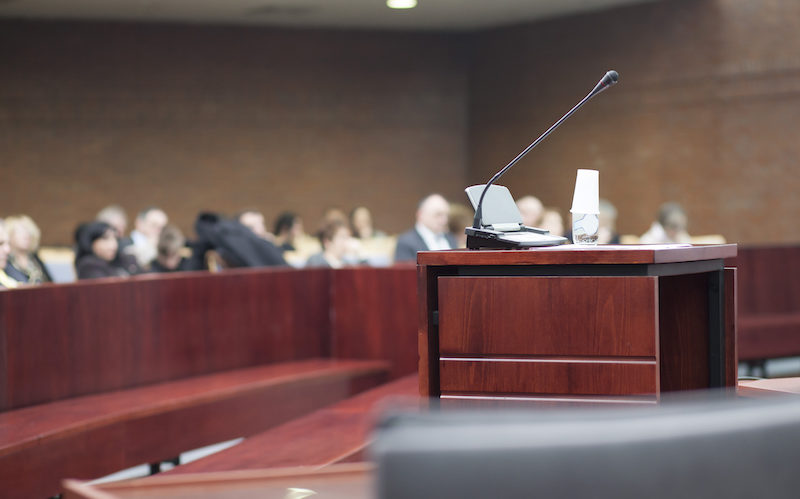
Improving the justice system requires more than just using technology and relaxing requirements for lawyers.
Professor Benjamin H. Barton and Judge Stephanos Bibas must be congratulated for sticking their necks out in their book, Rebooting Justice, by suggesting using fewer lawyers to resolve legal problems and embracing technology to assist people with accessing the justice system.
Lawyers rarely will admit that the justice system is failing for most of the U.S. public. Even rarer is the public pronouncement that continued reliance primarily on lawyers to facilitate the resolution of legal issues will eventually lead to a complete breakdown of the legal system.
Eighty percent of low-income individuals and the majority of moderate-income individuals do not have their legal needs met. It has been estimated that it would cost over $20 billion to $25 billion to provide one hour of a lawyer’s legal services to meet this vast need for assistance. Clearly, throwing money and effort to provide lawyers to all who need legal assistance is not the solution. I concur with Barton and Bibas’s out-of-the-box thinking and offer some friendly suggestions and cautions.
Barton and Bibas make suggestions for change within the existing adversarial legal system. That system is based on all parties having lawyers who know the law and who will advance the interests of their clients. But the current adversarial system is inherently unfair to individuals who represent themselves. It expects unrepresented litigants to know and understand the law and their rights, and it demands them to have the ability to advance their interests.
In the current system, untrained individuals do not fare well when facing an adversary with a lawyer. And although two unknowledgeable parties without lawyers will ultimately resolve their legal issues, the outcome may not comport with the law or be just. The use of technology provides greater access to being able to resolve legal problems but it does not necessarily obtain results that are fair or in accordance with the law either. But I am not willing to accept reforms that that just increase access to tools that can resolve legal problems but which do not also assure adherence to the law and the achievement of fair outcomes.
Lawyers and the public must embrace the fact that the adversarial system in today’s justice system does not work for the millions of individuals who must navigate the justice system without lawyers. Along with using technology to provide better access, I urge the justice system to abandon the notion fostered by an adversarial system that parties win or lose because of their ability to present their cases on their own, without transparency about rules and procedures and without assistance from the court, if needed. Instead, parties must be told what the law is and what both parties have to prove to win their case. They should be required to put forward their proof without the hurdles of discovery rules. They should receive a shared assessment of the strengths and weaknesses of their cases before negotiations take place or litigation moves forward.
Technology has the promise of helping moving past adversarial barriers to help better achieve substantive justice. But to use technology to provide better procedural and substantive justice, the legal system needs to be simplified. Forty-five million people in the United States read on or below a fifth-grade reading level, and 50 percent of adults cannot read books written on an eighth-grade reading level. The average court user struggles with understanding typical legal forms and terminology due to low reading levels. Simplification of processes and the use of plain language in both court forms and legal documents will make it easier to understand processes and legal terminology when litigants use technology.
Courts have been slow to implement simplification and plain language. Simplification and the use of plain language must be adopted prior to or along with the development of technology. Implementing technology on a widespread basis without simplification and plain language compounds the problems that the average court user has with the legal system.
More widespread use of technology will benefit individuals struggling with legal problems, but it will not be the solution for many of those individuals. Many users of the justice system will confront obstacles created by low reading levels, reliance on oral instead of written communication by persons living in generational poverty, lack of access to technology, and technophobia. Some individuals will need lawyers and any substitution for legal counsel will not suffice. Learning to triage resources is essential. The legal system must use technology to increase justice, but it must be careful not to resort to a one-solution-fits-all approach.
Barton and Bibas’s suggestion that lawyers be eliminated from lower criminal cases gives me the most pause. Although they acknowledge that their proposal should not be used in some circumstances, even the smallest conviction can snowball into significant problems. Fines that get imposed but then cannot be paid can result in significant debts and imprisonment. The consequences of insignificant criminal convictions on immigration status have heightened recently, and the future resolution of this issue remains uncertain. Barton and Bibas are correct in their position that the legal system’s provision of attorneys for quality criminal defense is wholly lacking, but it is essential that courts proceed with reforms in this area only with the greatest caution.
Many judges are loath to handle cases with unrepresented litigants. Lawyers serve as a buffer between the judge and the defendant. More education of judges on how to handle cases without lawyers would be needed to ensure that Barton and Bibas’s suggestion to eliminate lawyers could be put in place.
Lawyers also serve as the eyes of the legal system, often setting right what happens in a courtroom that untrained litigants would not recognize as wrong or have the power to change. Before lawyers are eliminated, the legal system will need to consider how to ensure that there are mechanisms for spotting and resolving problems in the courtroom.
Changing how the legal profession perceives justice and its administration requires changing notions embedded in the justice system since the founding of this country. Law schools and law professors must ignite conversations and be the catalyst for change.
To reboot the system, Barton will need more academic support for seeing his proposals embraced before the system collapses. Law schools create lawyers who implement policy and judges who can change court systems. Rebooting Justice should be required reading in law school.
Bibas, a former law professor, is now a judge for the U.S. Court of Appeals for the Third Circuit. He is on a large stage to influence thinking on these issues. I wish him courage and energy to persuade the judiciary.
The justice system will reap the benefit of Barton and Bibas’s thinking if its leaders keep the conversation going and are open to change.
This essay is part of an eight-part series, entitled Revamping the American Justice System.




